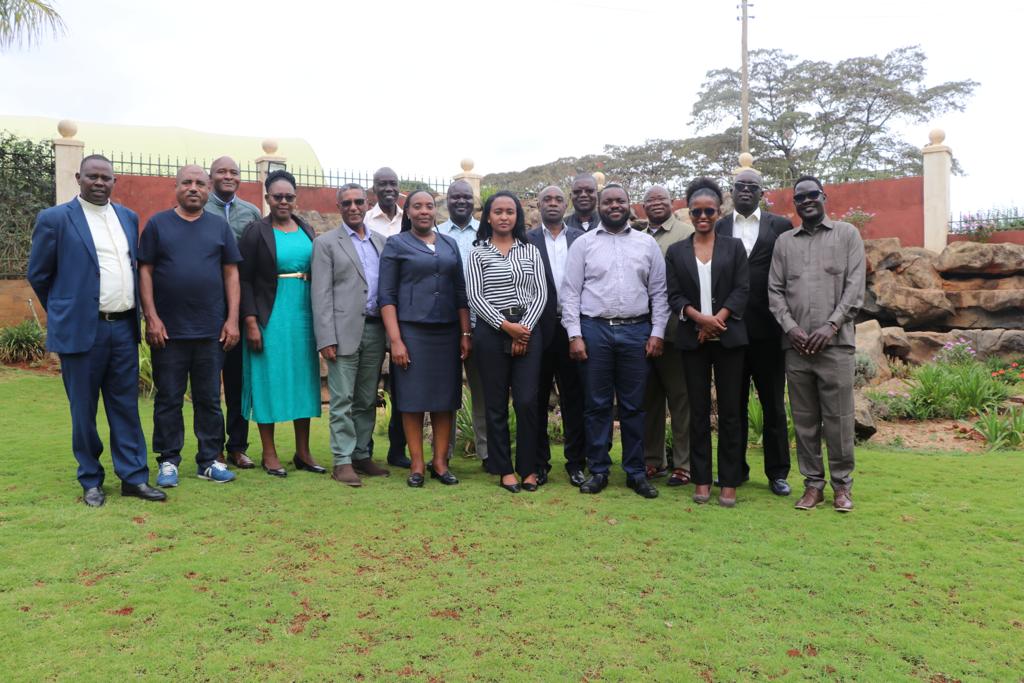AMECEA: Structured Engagements Key in Peace Building, Cleric to AMECEA National Coordinators

Participants during the Regional Peace Program
Sr. Jecinter Antoinette Okoth, FSSA
As a way of promoting peace building to enhance social cohesion in the Association of Member Episcopal Conferences in Eastern Africa (AMECEA) region, the Coordinator for the department of Promoting Integral Human Development (PIHD) at AMECEA has empathized the need to reinforce structured engagements with peace building agencies.
Speaking at a Regional Peace Program (RPP) workshop that brought together the PIHD coordinators from Ethiopia and South Sudan conferences and other peace actors including African Council of Religious Leaders—Religions for Peace (ACRL—RfP), All Africa Conference of Churches (AACC), Arigatou International, Fellowship of Christian Councils and Churches in the Great Lakes and Horn of Africa (FECCLAHA), Hekima Institute of Peace Studies and International Relations (HIPSIR) and International Centre for Peace Human Rights and Development in Africa (IPHRD- Africa) Fr. Paul Mung’athia Igweta stressed on better ways of solving conflict in the region.
“There is need to come up with views on policy development gaps and a targeted advocacy strategy which reflects aspiration of the community,” Fr. Igweta shared with stakeholders and peace building agencies in his opening remarks during a three-day workshop held in Kenya’s capital Nairobi.
He added that developing policies and advocacy strategies “would advance structured engagements with the regional and national duty bearers.”
According to Fr. Igweta, the workshop on targeted advocacy for service providers and peace building actors towards social and political stabilization in the horn of Africa region, identified Ethiopia and South Sudan as countries in great need of peace program because of the protracted conflicts that have been ongoing.
while addressing dozens of participants who attended the workshop, Fr. Igweta shared his observation on pointers of potential regional instability in the region saying, “environment of violent conflict is manifested in the situations such as political stalemate in Somalia; uncertainty over the constitutional review, implementation of peace process and advancement of transitional justice; and the seemingly non-ending civil war in Ethiopia and tension over electoral process in countries such as Kenya and Uganda.”
Other than situations of rising violent conflicts in the identified countries, the horn of Africa region continues to experience numerous and complex situations of humanitarian challenges including “the ever present cases of natural disasters.”
 The results of which Fr. Igweta said, “Both man-made and natural disasters have driven huge humanitarian catastrophe leading to a hunger crisis.”
The results of which Fr. Igweta said, “Both man-made and natural disasters have driven huge humanitarian catastrophe leading to a hunger crisis.”
He noted further that social, political and economic recovery and stabilization of the region will still remain fragile and potentially capable of injecting new turbulence if nothing is done.
As a matter of fact, policy gaps between the communities’ experiences and state, and inter- state level formulations continues to be a challenge affecting the stability of the region, the cleric acknowledged and underscored, “Without linking policies development with the local realities, it is possible that communities will continue experiencing disruptions of social and political order as they will feel, among others, disenfranchised and discriminated.”
He added that, “Such contemporary example of policy gaps is the current situation in South Sudan where the on-going conflict represents deep-rooted ethnic tensions and power struggles that were not adequately resolved in the rush to establish a unified government following independence.”
Even though there are many actors that have advocacy agenda with the key regional duty bearers Fr. Paul narrated, “There is inadequate spaces through which these experiences are shared, synergy is developed and communities are critically engaged.”
The RPP project seeks to initiate a process of ensuring that social and political stability is based on the unity and cooperation of the citizens as the initiative is expected to correct the current regional landscape in which political stability is owed to a great deal, elite unity.


